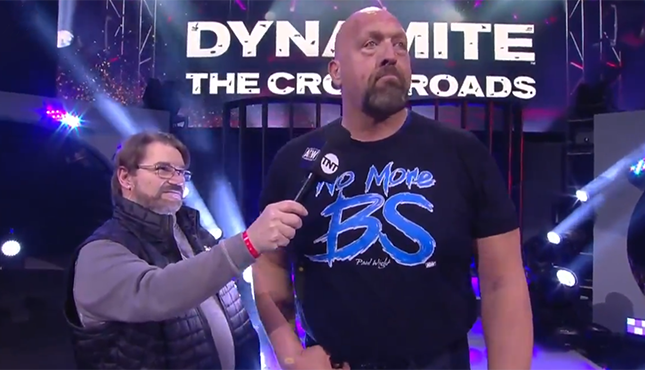wrestling / News
Paul Wight On Working With Tony Schiavone On AEW Dark: Elevation, Giving Advice to Talent
 image Credit: AEW
image Credit: AEW
Paul Wight discussed his work with Tony Schiavone on AEW Dark: Elevation, giving advice to the younger talent in AEW and more in a new interview. Wight spoke with Busted Open Radio promoting tonight’s Double or Nothing PPV, and you can check out some highlights below courtesy of Wrestling Inc:
On working with Tony Schiavone on commentary for AEW Dark: Elevation: “Tony and I always got along great while I was in WCW. It’s always funny now because I used to talk to Tony a lot when I first started in WCW. I was green as grass and, though everybody was excellent to me in WCW then, I didn’t ask a lot of questions to a lot of guys cause I didn’t want to be that annoying guy. I was twelve, thirteen years younger than anybody else in that locker room. I didn’t want to be ‘hey what about this, what about that?’ But one of the guys that I’d always ask little questions about or why did so and so say this, or why it was done like that, is Tony.
“And it’s funny. After all the years of me being in WWE and not seeing Tony, and then to come together in AEW, we just clicked right back together. I think it’s a respect, it’s a trust. You know when you’re doin that position, there’s a lot of stress. Anytime you’re talking live and you have to have coherent thoughts, funny anecdotes and also get your point across, there’s a lot of mental juggling going on. So you want to be in an environment with somebody you definitely trust. Like me, sometimes my mouth forgets to work, and Tony always slides right in there and finishes my thoughts for me. So it helps. I don’t think giants are known for being eloquent speakers, but I’m going to fake it as long as I can.”
On if he’s been asked for advice by younger talent in AEW: “Absolutely. Absolutely. I don’t know the last time when I’ve been inspired so much by younger talent. AEW does things a little bit differently. AEW doesn’t quite micromanage to the detail WWE does, or NXT does. It’s a different program with a different feeling. So to me, I can actually give my honest opinion when asked, because I don’t have to give an opinion that might be contrary to what the status quo is. I have different philosophies on tag team wrestling than where I came from from WWE on different things. Like I still believe both heels feed a comeback in a tag match. That’s exciting. When that babyface is on the corner, his partner has taken out the heat and he makes the hot tag, you want to see that babyface make a comeback on both heels. That’s what’s exciting, that’s what pulls you out of your seat. Philosophy is different, referee has all control, stuff like that.
“But yes, the talent does come up and it’s exciting for me to really break things down, explain it to them in a way that I don’t think a lot of people have a chance to take the time to explain it. Cause wrestling is really not that hard, it’s really not. It’s a story, beginning, middle and end. There’s a shine, there’s a cut off, there’s heat, there’s hope, there’s a comeback, there’s a finish. It’s really nice, I’ll put it that way, it’s nice to see the hunger and the passion these kids have. And not the hunger and passion of coming up and shaking your hand with catering or, you know, doing that little toe together head bow thing they do all the time. Not that, but genuinely coming up in a relaxed environment, and sitting down and asking questions about their character and what they did and what decisions they make and how they continue to improve. And having that influence and being able to help someone, in a free environment, makes it all worth it.”
On his interview segments on Elevation: “I’m glad that it doesn’t happen a lot more because it’s a unique opportunity for to me too. Because I actually do get to sit down with this talent and I get to talk them and I get to really see their personality. Before the cameras go on I’m talking to them a little bit and feeling them out, and asking them what I can do to help them or what the point they’re trying to get across in this interview and what not. And that’s a great introduction for me also to learn about this talent and to help them. Because I’ve got four decades of experience. Hopefully I can lead them in the right way.
“There’s so many times Mark and I have done interviews where someone will sit down and they’ll say ‘okay, tell me what it’s like to be a pro wrestler.’ And it’s like ‘well what would you like me to tell you? It’s about the money and the miles. I don’t know, what do you want to know?’ We have an interviewer that can help bring your story along that understands who you are as a talent that really helps. And that’s a great thing for me to do at this age now, to really help these guys move along. I got to do a lot of stuff back in the day with Tony and Mean Gene Okerlund and JR and Michael Cole. I had a lot of guys that really helped tell my stories along the way as well. It’s a good thing to be able to do.”







